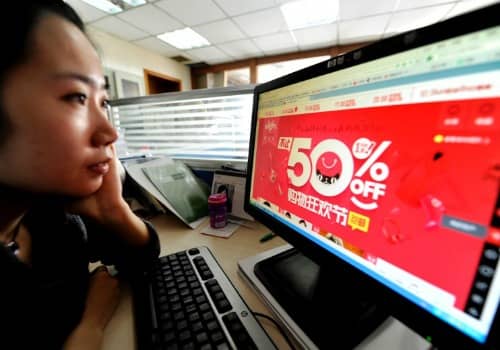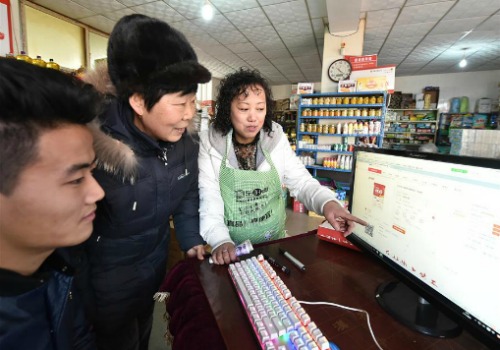China Brands, Marketing & Consumers
Top 5 Chinese Online Consumer Trends After Single’s Day Sales
The world’s biggest online sale of the year, China’s Single’s Day, took place on November 11. What’s on Weibo gives an overview of the latest trends and biggest brands, showing how China’s middle-class online consumer habits are undergoing drastic changes.
Published
8 years agoon

WHAT’S ON WEIBO ARCHIVE | PREMIUM CONTENT ARTICLE
The world’s biggest online sale of the year, China’s Single’s Day, took place on November 11. Some Chinese consumer trends have become especially visible after the big sales. What’s on Weibo gives an overview of the latest trends and biggest brands, showing how China’s middle-class online consumer habits are undergoing drastic changes. [Premium Content by What’s on Weibo].
China’s 11/11 Single’s Day, the world’s biggest online shopping event of the year, has once again exceeded the sale figures of previous years.
The 8th edition of China’s Online Single’s Day Shopping Festival, that was initiated by e-commerce giant Alibaba in 2009, broke all previous sales records with a 24-hour sales volume of $17.6 billion (120.7 billion RMB) on Alibaba’s Tmall (天猫) on November 11. Online shopping mall JD.com also had 60% more sales than the previous year.
With so much success, many e-commerce platforms have extended the shopping festival until November 18. Time to see which Chinese online consumer trends are especially apparent during this year’s Single Day’s sales.
[blendlebutton]
1. Smartphone & Tablets: Made-in-China Wins
Together with fashion and health and beauty products, electronics are among the top-selling products of China’s biggest annual online sale. This year’s Single’s Day has shown that the iPhone7 is still very popular among Chinese consumers, despite the subdued reactions in China to its release in September.
The Gome e-commerce chain (国美在线) revealed that the iPhone7, which was priced at 4888 RMB (±719 US$), was the store’s number one best-seller of November 11. Gome sold 22000 devices within 24 hours.
Despite the surge in iPhone sales, made-in-China smartphones were the undeniable winner of the Single’s Day smartphone sales. Overall, netizens bought more Chinese smartphone brands than international ones. According to the Single’s Day sales numbers of JD.com, no less than 8 of the top 10 best-selling smartphones were domestically produced mobile phones. China’s Huawei and Xiaomi brands did especially well on Alibaba’s Tmall.

The surge in sales of Chinese smartphones is also promising for the international market: Huawei aims to become the world’s second-largest maker of smartphones within two years.
The growth of Chinese brand popularity is not just noticeable on the smartphone market – Chinese brands are also winning over tablet buyers. Apple is no longer the only big player on the Chinese tablet market, with brands such as Lenovo and Huawei seeing considerable growth in tablet sales.
2. Good for the Baby
Of the non-electronic products, it is especially baby products that did well on China’s Single’s Day. Anything from milk powder to baby wipes or diapers were popular during the 11/11 sales. Vastly different from the electronic market, it is especially foreign brands such as Friso (Friesland Campina, Dutch) and Moony (Japanese) that are most popular among Chinese consumers.
As China’s consumer trust in made-in-China baby brands has been damaged through various safety scandals over previous years, foreign brands are leading the market.
What is remarkable about this year’s sales, as revealed by China’s e-commerce platform Beibei (贝贝网, focused on maternal and infant products) is that the children’s clothing market is more booming than ever. Together with the surge in other baby- and mother-related products, the shift to bigger sales of these non-traditional products shows that China’s ‘Mummy Economy’ (妈妈经济) is becoming more relevant.

According to Beibei, there are over 50 million Chinese mothers registered as e-commerce users on their platform. Their data shows that there are different consumer trends within this group in China.
Mothers from the northeast of China, for example, will buy more baby’s clothes and shoes, as it gets colder in those regions than the more southern parts of China. The mothers in the Yangtze River Delta area (Shanghai, Jiangsu, Zhejiang) are known to buy many baby snacks and foodstuff. In the south of China, nearer to Hong Kong, consumers mainly buy baby necessities such as diapers and baby wipes.
3. Fashion: Individual Style over Traditional Brands
Despite the popularity of electronics and baby products, clothing and lifestyle goods are still the number one best-selling products in China’s online sales. According to sales numbers released by JD.com, 40% of all their 11/11 sales were in the apparel & lifestyle category.
Noteworthy non-Chinese brand names are Lee, TUMI and Guess, which respectively sold 43 times, 20 times, and 70 times more clothes this year than in previous years.
Although traditional international luxury brands such as Burberry and MaxMara remain popular, new sales data shows that Chinese consumers now, for the first time, pursue more non-mainstream brands for their style than the established luxury brands.
A good example is the growing popularity of the Canadian apparel brand Canada Goose, which completely sold out on Chinese fashion e-commerce site Xiu.com (走秀网) on November 11. The brand is known for its warm and stylish outerwear. Another non-mainstream popular brand is the Italian designer clothes & accessories label Mr & Mrs Italy, which was only recently introduced on fashion platform Xiu.com and became hot selling on 11/11.

Other upcoming trendy brands such as the Scandinavian Acne Studios and & Other Stories (by the same fashion heads as H&M) were also surprising best-selling names that are all about style.

With Chinese middle-class consumers now gradually attaching more importance to style, originality, and quality of a label than its fame, somewhat more low-key designer brands like Brunello Cucinelli or Loro Piana are starting to replace classic Louis Vuitton or Burberry brands.
According to Xiu.com representatives, these new developments show that China’s middle-class consumer habits are now undergoing dramatic changes. People are no longer pursuing a bag only because it has an LV logo – they want a bag that suits their own style and needs.
4. China’s New Online Consumers: The Rise of Smaller Towns
Although first- and second-tier cities are still the most important consumer markets for online e-commerce platforms, this year’s sales data point out that consumers in third-tier cities and provincial level towns are becoming an important target group.
E-commerce giant JD.com saw a substantial growth in orders from prefectural cities and smaller towns from provinces such as Guizhou, Jiangxi, Hubei, Henan, and Yunnan.
In 2011, “the rise of China’s 2nd and 3rd tier cities” was a hot topic in the media. Five years later, this trend has shifted to China’s rural areas, where the new consumers are located.

Earlier this year, Bloomberg reported that 77.14 million rural Chinese shopped online in 2015, which was already a 40.6 percent increase from 2014. On average, rural Chinese spend more online than their urban counterparts, and their online spending is growing faster.
According to Economics Daily, drastic increases in sales to consumers from smaller towns and villages shows the improving living standards in these areas. High-end products like refrigerators and air-conditionings are among their top-selling products for this consumer group.
The rise of China’s more third-tier and rural consumers is closely connected to China’s booming and readily available e-commerce, that has made rural consumer demand strong. With China’s online population now exceeding 700 million people, China’s rural netizens are growing steadily – that new tablet or heater is now just a few clicks away.
5. The Power of the Post-1990s Generation
The sales data from this year’s Single’s Day as provided by the Gome (国美) e-commerce platform have pointed out that the majority of orders (which had a staggering growth of 268% compared to last year) were placed by consumers below the age of 40. Of all online customers on Single’s Day, 85% were below the age of 40.
Within this group, 47% of people are of the 16-29 age category and 34% aged between 30-39. Young women are more active online consumers than the men; 67% of all purchases were done by women.

The Gome data shows the power of the post-1990s consumer. People of the generation born after 1990, often referred to as the ‘Post 90s’ or ‘jiulinghou‘ (九零后) are also called “marketers’ dream consumers” for their impulsiveness in buying goods, and their general pursuit of products that improve their happiness; they are the ultimate consumers, much more willing to spend money than the generations before them.
With a new young generation of eager online consumers, the rise of rural e-shoppers and a thriving ‘mummy economy’, China’s e-commerce companies having something to look forward to for their next year’s Single’s Day. The biggest online shopping event in the world is only about to get bigger.
– By Manya Koetse
Follow on Twitter or Like on Facebook
Sources:
Part of this article on based on the 14 November article by Zhao Chenting (赵陈婷) originally published on http://www.yicai.com/..
Other sources are linked to within the article.
©2016 Whatsonweibo. All rights reserved. Do not reproduce our content without permission – you can contact us at info@whatsonweibo.com.
[/blendlebutton]
Manya is the founder and editor-in-chief of What's on Weibo, offering independent analysis of social trends, online media, and digital culture in China for over a decade. Subscribe to gain access to content, including the Weibo Watch newsletter, which provides deeper insights into the China trends that matter. More about Manya at manyakoetse.com or follow on X.

China Arts & Entertainment
Controversial Wanghong Livestreamers Are Becoming a Weibo Staple in China
‘Wanghong’ was a mark of online fame; now, it’s increasingly tied to controversy and scandal.
Published
6 months agoon
October 27, 2024
As livestreaming continues to gain popularity in China, so do the controversies surrounding the industry. Negative headlines involving high-profile livestreamers, as well as aspiring influencers hoping to make it big, frequently dominate Weibo’s trending topics.
These headlines usually revolve around China’s so-called wǎnghóng (网红) influencers. Wanghong is a shortened form of the phrase “internet celebrity” (wǎngluò hóngrén 网络红人). The term doesn’t just refer to internet personalities but also captures the viral nature of their influence—describing content or trends that gain rapid online attention and spread widely across social media.
Recently, an incident sparked debate over China’s wanghong livestreamers, focusing on Xiaohuxing (@小虎行), a streamer with around 60,000 followers on Douyin, who primarily posts evaluations of civil aviation services in China.

Xiaohuxing (@小虎行)
On October 15, 2024, at Shenzhen Bao’an International Airport, Xiaohuxing confronted a volunteer at the automated check-in counter, insisting she remove her mask while livestreaming the entire encounter. He was heard demanding, “What gives you the right to wear a mask? What gives you the right not to take it off?” and even attempted to forcibly remove her mask, challenging her to call the police.

During the livestream, the livestreamer confronted the woman on the right for wearing a facemask.
He also argued with a male traveler who tried to intervene. In the end, the airport’s security officers detained him. Shortly after the incident, a video of the livestream went viral on Weibo under various hashtags (e.g. #网红小虎行机场强迫志愿者摘口罩#) and attracted millions of views. The following day, Xiaohuxing’s Douyin account was banned, and all his videos were removed. The Shenzhen Public Security Bureau later announced that the account’s owner, identified as Wang, had been placed in administrative detention.
On October 13, just days before, another livestreaming controversy erupted at Guangzhou Baiyun International Airport. Malatang (@麻辣烫), a popular Douyin streamer with over a million followers, secretly filmed a young couple kissing and mocked them, continuing to film while passing through security—an area where filming is prohibited.
Her livestream quickly went viral, sparking discussions about unauthorized filming and misconduct among Chinese wanghong. In response, Malatang’s agent posted an apology video. However, the affected couple hired a lawyer and reported the incident to the police (#被百万粉丝网红偷拍当事人发声#). On October 17, Malatang’s Douyin account was banned, and her videos were removed.

Livestreamer Malatang making fun of the couple in the back at the airport.
In both cases, netizens uncovered additional examples of inappropriate behavior by Xiaohuxing and Malatang in past broadcasts. For example, Xiaohuxing was reportedly aggressive towards a flight attendant, demanding she kneel to serve him, while Malatang was criticized for scolding a delivery person who declined to interact with her on camera.
Comments on Weibo included, “They’ll do anything for traffic. Wanghong are getting a bad reputation because of people like this.” Another added, “It seems as if ‘wanghong’ has become a negative term now.”
Rising Scrutiny in China’s Wanghong Economy
Xiaohuxing and Malatang are far from isolated cases. Recently, many other wanghong livestreamers have also been caught up in negative news.
One such figure is Dong Yuhui (董宇辉), a former English teacher at New Oriental (新东方) who transitioned to livestreaming for East Buy (东方甄选), where he mixed education with e-commerce (read here). Dong gained significant popularity and boosted East Buy’s brand before leaving to start his own company. Recently, however, Dong faced backlash for inaccurate statements about Marie Curie during an October 9 livestream. He incorrectly claimed that Curie discovered uranium, invented the X-ray machine, and won the Nobel Prize in Literature, among other things.
Considering his public image as a knowledgeable “teacher” livestreamer, this incident sparked skepticism among viewers about his actual expertise. A related hashtag (#董宇辉称居里夫人获得诺贝尔文学奖#) garnered over 81 million views on Weibo. In addition to this criticism, Dong is also being questioned about potential false advertising, which is a major challenge for all livestreamers selling products during their streams.

Dong Yuhui (董宇辉) during one of his livestreams.
Another popular livestreamer, Dongbei Yujie (@东北雨姐), is currently also facing criticism over product quality and false advertising claims. Originally from Northeast China, Dongbei Yujie shares content focused on rural life in the region. Recently, her Douyin account, which boasts an impressive 22 million followers, was muted due to concerns over the quality of products she promoted, such as sweet potato noodles (which reportedly contained no sweet potato). Despite issuing public apologies—which have garnered over 160 million views under the hashtag “Dongbei Yujie Apologizes” (#东北雨姐道歉#)—the controversy has impacted her account and led to a penalty of 1.65 million yuan (approximately 231,900 USD).

From Dongbei Yujie’s apology video
Former top Douyin livestreamer Fengkuang Xiaoyangge (@疯狂小杨哥) is also facing a career downturn. Leading up to the 2024 Mid-Autumn Festival, he promoted Hong Kong Meicheng mooncakes in his livestreams, branding them as a high-end Hong Kong product. However, it was soon revealed that these mooncakes had no retail presence in Hong Kong and were primarily produced in Guangzhou and Foshan, sparking accusations of deceptive marketing. Due to this incident and previous cases of misleading advertising, his company came under investigation and was penalized. In just a few weeks, Fengkuang Xiaoyangge lost over 8.5 million followers (#小杨哥掉粉超850万#).

Fengkuang Xiaoyangge (@疯狂小杨哥) and the mooncake controversy.
It’s not only ecommerce livestreamers who are getting caught up in scandal. Recently, the influencer “Xiaoxiao Nuli Shenghuo” (@小小努力生活) and her mother were arrested for fabricating a tragic story – including abandonment, adoption, and hardships – to gain sympathy from over one million followers and earn money through donations and sales. They, and two others who helped them manage their account, were sentenced to ten days in prison for ‘false advertising.’
Wanghong Fame: Opportunity and Risk
China’s so-called ‘wanghong economy’ has surged in recent years, with countless content creators emerging across platforms like Douyin, Kuaishou, and Taobao Live. These platforms have transformed interactions between content creators and viewers and changed how products are marketed and sold.
For many aspiring influencers, becoming a livestreamer is the first step to building a presence in the streaming world. It serves as a gateway to attracting traffic and potentially monetizing their online influence.
However, before achieving widespread fame, some livestreamers resort to using outrageous or even offensive content to capture attention, even if it leads to criticism. For example, before his account was banned, Xiaohuxing set his comment section to allow only followers to comment, gaining 3,000 new followers after his controversial livestream at Shenzhen Airport went viral. Many speculated that some followers joined just to leave critical comments, but it nonetheless grew his following.
As livestreamers gain significant fame, they must exercise greater caution, as they often hold substantial influence over their audiences, making accuracy essential. Mistakes, whether intentional or not, can quickly erode trust, as seen in the example of the super popular Dong Yuhui, who faced backlash after his inaccurate comment about Marie Curie sparked public criticism.
China’s top makeup livestreamer, Li Jiaqi (李佳琦), experienced a similar reputational crisis in September last year. Responding dismissively to a viewer who commented on the high price of an eyebrow pencil, Li replied, “Have you received a raise after all these years? Have you worked hard enough?” Commentators pointed out that the pencil’s cost per gram was double that of gold at the time. Accused of “forgetting his roots” as a former humble salesman, Li lost one million Weibo followers in a day (read more here).

This meme shows that many viewers did not feel moved by Li’s apologetic tears after the eyepencil incident.
Despite the challenges and risks, becoming a wanghong remains an attractive career path for many. A mid-2023 Weibo survey on “Contemporary Employment Trends” showed that 61.6% of nearly 10,000 recent graduates were open to emerging professions like livestreaming, while 38.4% preferred more traditional career paths.
Taming the Wanghong Economy
In response to the increasing number of controversies and scandals brought by some wanghong livestreamers, Chinese authorities are implementing stricter regulations to monitor the livestreaming industry.
In 2021, China’s Propaganda Department and other authorities began emphasizing the societal influence of online influencers as role models. That year, the China Association of Performing Arts introduced the “Management Measures for the Warning and Return of Online Hosts” (网络主播警示与复出管理办法), which makes it challenging, if not impossible, for “canceled” celebrities to stage a comeback as livestreamers (read more).
The Regulation on the Implementation of the Law of the People’s Republic of China on the Protection of Consumer Rights and Interests (中华人民共和国消费者权益保护法实施条例), effective July 1, 2024, imposes stricter rules on livestream sales. It requires livestreams to disclose both the promoter and the product owner and mandates platforms to protect consumer rights. In cases of illegal activity, the platform, livestreaming room, and host are all held accountable. Violations may result in warnings, confiscation of illegal earnings, fines, business suspensions, or even the revocation of business licenses.
These regulations have created a more controlled “wanghong” economy, a marked shift from the earlier, more unregulated era of livestreaming. While some view these measures as restrictive, many commenters support the tighter oversight.
A well-known Kuaishou influencer, who collaborates with a person with dwarfism, recently faced backlash for sharing “vulgar content,” including videos where he kicks his collaborator (see video) or stages sensational scenes just for attention.
Most commenters welcome the recent wave of criticism and actions taken against such influencers, including Xiaohuxing and Dongbei Yujie, for their behavior. “It’s easy to become famous and make money like this,” commenters noted, adding, “It’s good to see the industry getting cleaned up.”
State media outlet People’s Daily echoed this sentiment in an October 21 commentary, stating, “No matter how many fans you have or how high your traffic is, legal lines must not be crossed. Those who cross the red line will ultimately pay the price.”
This article and recent incidents have sparked more online discussions about the kind of influencers needed in the livestreaming era. Many suggest that, beyond adhering to legal boundaries, celebrity livestreamers should demonstrate a higher moral standard and responsibility within this digital landscape. “We need positive energy, we need people who are authentic,” one Weibo user wrote.
Others, however, believe misbehaving “wanghong” livestreamers naturally face consequences: “They rise fast, but their popularity fades just as quickly.”
When asked, “What kind of influencers do we need?” one commenter responded, “We don’t need influencers at all.”
By Wendy Huang
Follow @whatsonweibo
Edited for clarity by Manya Koetse
Spotted a mistake or want to add something? Please let us know in comments below or email us. Please note that your comment below will need to be manually approved if you’re a first-time poster here.
©2024 Whatsonweibo. All rights reserved. Do not reproduce our content without permission – you can contact us at info@whatsonweibo.com
China Books & Literature
Why Chinese Publishers Are Boycotting the 618 Shopping Festival
Bookworms love to get a good deal on books, but when the deals are too good, it can actually harm the publishing industry.
Published
11 months agoon
June 8, 2024By
Ruixin Zhang
JD.com’s 618 shopping festival is driving down book prices to such an extent that it has prompted a boycott by Chinese publishers, who are concerned about the financial sustainability of their industry.
When June begins, promotional campaigns for China’s 618 Online Shopping Festival suddenly appear everywhere—it’s hard to ignore.
The 618 Festival is a product of China’s booming e-commerce culture. Taking place annually on June 18th, it is China’s largest mid-year shopping carnival. While Alibaba’s “Singles’ Day” shopping festival has been taking place on November 11th since 2009, the 618 Festival was launched by another Chinese e-commerce giant, JD.com (京东), to celebrate the company’s anniversary, boost its sales, and increase its brand value.
By now, other e-commerce platforms such as Taobao and Pinduoduo have joined the 618 Festival, and it has turned into another major nationwide shopping spree event.
For many book lovers in China, 618 has become the perfect opportunity to stock up on books. In previous years, e-commerce platforms like JD.com and Dangdang (当当) would roll out tempting offers during the festival, such as “300 RMB ($41) off for every 500 RMB ($69) spent” or “50 RMB ($7) off for every 100 RMB ($13.8) spent.”
Starting in May, about a month before 618, the largest bookworm community group on the Douban platform, nicknamed “Buying Like Landsliding, Reading Like Silk Spinning” (买书如山倒,看书如抽丝), would start buzzing with activity, discussing book sales, comparing shopping lists, or sharing views about different issues.

Social media users share lists of which books to buy during the 618 shopping festivities.
This year, however, the mood within the group was different. Many members posted that before the 618 season began, books from various publishers were suddenly taken down from e-commerce platforms, disappearing from their online shopping carts. This unusual occurrence sparked discussions among book lovers, with speculations arising about a potential conflict between Chinese publishers and e-commerce platforms.
A joint statement posted in May provided clarity. According to Chinese media outlet The Paper (@澎湃新闻), eight publishers in Beijing and the Shanghai Publishing and Distribution Association, which represent 46 publishing units in Shanghai, issued a statement indicating they refuse to participate in this year’s 618 promotional campaign as proposed by JD.com.
The collective industry boycott has a clear motivation: during JD’s 618 promotional campaign, which offers all books at steep discounts (e.g., 60-70% off) for eight days, publishers lose money on each book sold. Meanwhile, JD.com continues to profit by forcing publishers to sell books at significantly reduced prices (e.g., 80% off). For many publishers, it is simply not sustainable to sell books at 20% of the original price.
One person who has openly spoken out against JD.com’s practices is Shen Haobo (沈浩波), founder and CEO of Chinese book publisher Motie Group (磨铁集团). Shen shared a post on WeChat Moments on May 31st, stating that Motie has completely stopped shipping to JD.com as it opposes the company’s low-price promotions. Shen said it felt like JD.com is “repeatedly rubbing our faces into the ground.”
Nevertheless, many netizens expressed confusion over the situation. Under the hashtag topic “Multiple Publishers Are Boycotting the 618 Book Promotions” (#多家出版社抵制618图书大促#), people complained about the relatively high cost of physical books.
With a single legitimate copy often costing 50-60 RMB ($7-$8.3), and children’s books often costing much more, many Chinese readers can only afford to buy books during big sales. They question the justification for these rising prices, as books used to be much more affordable.
Book blogger TaoLangGe (@陶朗歌) argues that for ordinary readers in China, the removal of discounted books is not good news. As consumers, most people are not concerned with the “life and death of the publishing industry” and naturally prefer cheaper books.
However, industry insiders argue that a “price war” on books may not truly benefit buyers in the end, as it is actually driving up the prices as a forced response to the frequent discount promotions by e-commerce platforms.
China News (@中国新闻网) interviewed publisher San Shi (三石), who noted that people’s expectations of book prices can be easily influenced by promotional activities, leading to a subconscious belief that purchasing books at such low prices is normal. Publishers, therefore, feel compelled to reduce costs and adopt price competition to attract buyers. However, the space for cost reduction in paper and printing is limited.
Eventually, this pressure could affect the quality and layout of books, including their binding, design, and editing. In the long run, if a vicious cycle develops, it would be detrimental to the production and publication of high-quality books, ultimately disappointing book lovers who will struggle to find the books they want, in the format they prefer.
This debate temporarily resolved with JD.com’s compromise. According to The Paper, JD.com has started to abandon its previous strategy of offering extreme discounts across all book categories. Publishers now have a certain degree of autonomy, able to decide the types of books and discount rates for platform promotions.
While most previously delisted books have returned for sale, JD.com’s silence on their official social media channels leaves people worried about the future of China’s publishing industry in an era dominated by e-commerce platforms, especially at a time when online shops and livestreamers keep competing over who has the best book deals, hyping up promotional campaigns like ‘9.9 RMB ($1.4) per book with free shipping’ to ‘1 RMB ($0.15) books.’
This year’s developments surrounding the publishing industry and 618 has led to some discussions that have created more awareness among Chinese consumers about the true price of books. “I was planning to bulk buy books this year,” one commenter wrote: “But then I looked at my bookshelf and saw that some of last year’s books haven’t even been unwrapped yet.”
Another commenter wrote: “Although I’m just an ordinary reader, I still feel very sad about this situation. It’s reasonable to say that lower prices are good for readers, but what I see is an unfavorable outlook for publishers and the book market. If this continues, no one will want to work in this industry, and for readers who do not like e-books and only prefer physical books, this is definitely not a good thing at all!”
By Ruixin Zhang, edited with further input by Manya Koetse
Independently reporting China trends for over a decade. Like what we do? Support us and get the story behind the hashtag by subscribing:
Spotted a mistake or want to add something? Please let us know in comments below or email us. First-time commenters, please be patient – we will have to manually approve your comment before it appears.
©2024 Whatsonweibo. All rights reserved. Do not reproduce our content without permission – you can contact us at info@whatsonweibo.com.
Subscribe

Aftermath of Suzhou Marathon’s “Pissing Gate”

Do You Know Who Li Gang Is? Anti-Corruption Official Arrested for Corruption

Chinese New Nickname for Trump Mixes Fairy Tales with Tariff War

China Trending Week 15/16: Gu Ming Viral Collab, Maozi & Meigui Fallout, Datong Post-Engagement Rape Case

China Reacts: 3 Trending Hashtags Shaping the Tariff War Narrative

“Dear Li Hua”: The TikTok/Xiaohongshu Honeymoon Explained

Beyond the Box Office: What’s Behind Ne Zha 2’s Success?

IShowSpeed in China: Streaming China’s Stories Well

15 Years of Weibo: The Evolution of China’s Social Media Giant

Tuning Into the Year of the Snake

TikTok Refugees, Xiaohongshu, and the Letters from Li Hua

“Black Myth: Wukong”: From Gaming Screens to the CMG Spring Festival Gala?

US-Russia Rapprochement and “Saint Zelensky”: Chinese Online Reactions to Trump’s Shake-Up

The ‘China-chic Girl’ Image and the Realities of China’s Competitive Food Delivery Market

Collective Grief Over “Big S”
Get in touch
Would you like to become a contributor, or do you have any tips or suggestions? Get in touch here!
Popular Reads
-

 China Insight12 months ago
China Insight12 months agoThe Tragic Story of “Fat Cat”: How a Chinese Gamer’s Suicide Went Viral
-

 China Digital11 months ago
China Digital11 months agoChina’s 2024 Gaokao Triggers Online Discussions on AI
-

 China Arts & Entertainment11 months ago
China Arts & Entertainment11 months agoSinging Competition or Patriotic Fight? Hunan TV’s ‘Singer 2024’ Stirs Nationalistic Sentiments
-

 China Brands, Marketing & Consumers12 months ago
China Brands, Marketing & Consumers12 months agoA Brew of Controversy: Lu Xun and LELECHA’s ‘Smoky’ Oolong Tea





